Holla! To all of our endearing readers who've followed us through the course of our progress as a significant channel for basketball news, we've got news for you - A Top 50 list of the greatest players in basketball history!
We asked 8 of our writers to name their top 50 players of all time. Giving a weightage of 100 points to the #1 pick and 51 to the #50 pick, we arrived at a list that encompasses much of the storied history of the game of basketball - with all of these players having played out the vast majority of their careers in the National Basketball Association (NBA).
In a weekly series, we will be releasing our ranks of the all-time greatest players of the game, as things stand at the end of the 2017-18 season. You can check out the countdown from #50 to #41 here, and #40 to #31 here. Here's the countdown from #30 up until #21!
#30 Allen Iverson
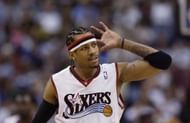
If you were growing up in the 90s and early 2000s and you had any sort of interest in basketball, Iverson is one of those players who you'd always remember. The Answer will always be remembered for being one of the most determined, hard-working and competitive players to ever play the game, and there's so much that he signified with his play on court through the course of his fascinating basketball journey.
Allen Iverson played in the NBA for 14 seasons and was elected as an All-Star for 11 of them. He has an MVP season to his credit, as well as 3 steals titles in consecutive years from 2000 till 2003. Despite being one of the lightest and shortest to ever play the game, Iverson was a giant of the game and often put all-time greats a whole foot bigger than him to shame.
In most people's eyes, Iverson is, the greatest pound-for-pound player in basketball history. He is the only player at his size (5'11", 160 pounds) to ever win the MVP award. The next smallest player to win the award is Stephen Curry, who has about 30 pounds and 3-4 inches on him.
He came into the league in 1996, a time when other than Michael Jordan, the league was dominated by superstar big men like Hakeem, Barkley, David Robinson, Patrick Ewing, Dikembe Mutombo and Alonzo Mourning - to name just a few - and brought forth the days of point guards dominating offenses; he often acted as both the 1 and the 2-guard in different stretches of games.
In fact, it was watching him dominate and run rings around defenses every single day that inspired the likes of Steph, Kyrie, Chris Paul, Westbrook, Wall and the other elite point guards in the league today, not to mention others like Isaiah Thomas and Nate Robinson.
If there is one Finals game that was a literal David vs Goliath battle, it was Game 1 of the 2001 NBA Finals, when The Answer willed the Sixers to a win at the Staples Center having carried them on a sore hip and a bruised elbow till that point.
#29 Jason Kidd
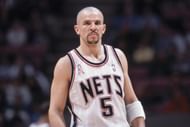
Kidd played college basketball for the California Golden Bears and was drafted second overall by the Dallas Mavericks in the first round of the 1994 NBA draft. He was named co-NBA Rookie of the Year in his first season with the Mavericks. Initially a defensive-minded player with limited offensive capabilities, Kidd was nonetheless a strong floor general right off the bat.
He improved his defense to such an extent that he's, in my eye, alongside Gary Payton and Chris Paul as the greatest two-way point guards in the game. He did a better job than either of the two in leading his teams to postseason success over the course of his career as well.
In a run that lasted nearly 7 years with the New Jersey Nets, Kidd led them to 2 NBA Finals and was arguably an MVP snub in both the 2001-02 and the 2002-03 seasons. The Nets floundered soon after, however, and Kidd's best years were wasted on a middling playoff team
In the middle of the 2007–08 season, Kidd was traded back to Dallas. This time, the Mavericks were in a much better position to contend, and at age 38, Kidd won his only NBA championship when Dallas defeated Miami in the 2011 NBA Finals. As the primary ballhandler and often the defender switched onto LeBron James, Kidd played a pivotal role in the Mavs' only title win in franchise history.
He finished his playing career in 2013 with the New York Knicks. The following season, he became the head coach of the Nets, who had relocated from New Jersey to Brooklyn. After one season, he moved to the Milwaukee Bucks, where he coached for four seasons until he was fired mid-season in 2018.
Kidd's ability to pass and rebound made him a regular triple-double threat and he retired ranked third all-time in the NBA for regular season triple-doubles with a career total of 107 and second in playoff triple-doubles with a career total of 11. He ranks second on the NBA all-time lists in career assists and steals and ninth on the 3-point field goals made category.
#28 John Stockton
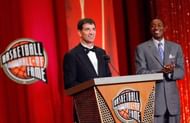
Stockton averaged a career double-double, with 13.1 points and 10.5 assists per game. He holds the NBA's record for most career assists (15,806) by a margin of more than 3,000, as well as the record for most career steals (3,265). He had five of the top six assists seasons in NBA history (the other belonging to Isiah Thomas).
He held the NBA record for the most games and consecutive games played with one team, and is third in total games played, behind Kareem Abdul-Jabbar and Robert Parish.
He had previously held the record for most seasons played with one team until the 2015–16 NBA season. He missed only 22 games during his career, 18 of them in one season. He played in 38 games where he tallied 20 or more assists.
He and Karl Malone are regarded by many as the quintessential pick and roll duo. Apart from his passing skill, Stockton was also a capable scorer (13.1 points per game career average and a 51.5 career shooting percentage) with a reliable three-point shot (38.4% career average).
On defense, Stockton holds the NBA record for career steals with 3,265. In second place is Jason Kidd, with 2,684. Stockton was known for his unassuming, no-nonsense approach to the game, hard-nosed defense, and fanatical work-ethic in preparation, which resulted in his extreme durability.
He played 1,504 of 1,526 possible games in his 19-season career. In his first 13 seasons, he missed only four games (all in the 1989–90 season) until he missed the first 18 games of the 1997–98 season due to an injured MCL in his left knee sustained in the preseason.
That was the only major injury in his career, and he never missed another game after returning from that injury. Stockton's tenacity also earned him a reputation among some in the league as being a dirty player, as evidenced by a poll Sports Illustrated conducted in 1997 where he was voted as the second dirtiest player in the league behind Dennis Rodman.
On February 1, 1995, Stockton broke Magic Johnson's record of 9,921 career assists in a game in Salt Lake City against the Denver Nuggets with 6:22 left in the first half with a bounce pass to Karl Malone, ending up with 9,927 in a 129-98 win; it was his 860th game, vs. 874 for Johnson.
#27 John Havlicek
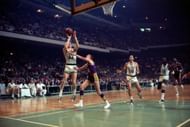
Havlicek was drafted by both the Celtics and the NFL's Cleveland Browns in 1962. After competing briefly as a wide receiver in the Browns' training camp that year, he focused his energies on playing for the Celtics, with head coach Red Auerbach later describing him as the "guts of the team." He was also known for his stamina, with competitors saying that it was a challenge just to keep up with him.
Nicknamed "Hondo" (inspired by the 1953 John Wayne movie of the same name), Havlicek revolutionized the "sixth man" role and has been immortalized for his clutch steal in the closing seconds of the 1965 Eastern Conference championship. 'Havlicek stole the ball' was a radio call that resonated around the basketball world as it helped the Celtics secure a 4-3 win in the series, which they capitalized on by going on to win the NBA Finals.
"On stamina alone, he'd be among the top players who ever played the game," longtime New York Knicks coach Red Holzman once said of Havlicek. "It would've been fair to those who had to play him or those who had to coach against him if he had been blessed only with his inhuman endurance. God had to compound it by making him a good scorer, smart ballhandler and intelligent defensive player with quickness of mind, hands and feet."
The 6-foot-5 Boston Celtics star was a perpetual-motion machine, a human dynamo who was legendary for wearing out opponents with his relentless baseline-to-baseline efforts. A star at both forward and guard, Havlicek's versatility made him perhaps the finest all-around player in the history of the NBA at the time.
An 8-time champion, Havlicek's 8-0 record in the Finals is unmatched by anyone in basketball history (in terms of total championships while staying undefeated at that stage).
#26 Elgin Baylor
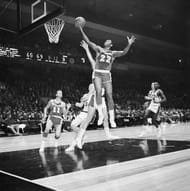
The greatest Laker that the average NBA fan might just not know about is Elgin Baylor - a swingman who created the model for every dominant swingman after his time.
Not many know, but the Minneapolis Lakers were in real danger of closing down a year before relocating to Los Angeles. The Minneapolis Lakers used the No. 1 overall pick in the 1958 NBA draft to select Baylor. They then convinced him to skip his senior year at Seattle University and instead join the pro ranks.
The team, several years removed from its glory days of George Mikan, was in trouble on the court and at the gate. The year prior to Baylor's arrival the Lakers finished 19–53 with a squad that was slow, bulky and aging. Baylor, whom the Lakers signed to play for $20,000 per year (a great amount of money at the time), was the franchise's last shot at survival.
With his superb athletic talents and all-round game, Baylor was seen as the kind of player who could save a franchise, and he did. According to Minneapolis Lakers owner Bob Short in a 1971 interview with the Los Angeles Times: "If he had turned me down then, I would have been out of business. The club would have gone bankrupt."
He perfected the tomahawk dunk and was one of the first great mid-range shooters of the game in an era when the 3-point line did not exist. The likes of MJ and Kobe, among others, have cited him as an influence to their playing styles.
Unfortunately for him, he has a 0-8 record in the Finals. Before encountering a knee injury that left him sapped of his elite athleticism, he came up against the Celtics led by Bill Russell on numerous occasions in the Finals, losing each time.
He retired early in the 1971-72 season after suffering another injury, though he still got a ring as a member of the roster earlier on in the season as the Lakers went 69-13 and won the Finals.
#25 Scottie Pippen
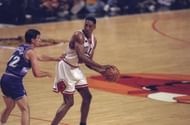
I would say it suffices to talk about Pippen as the only reason the Bulls were 6-time champions in the 1990s. Drafted by the Seattle Supersonics in 1987 with the #5 overall pick, the Bulls traded for the young small forward in order to pair Michael Jordan with the kind of swingman that could take some of the pressure off his shoulders.
Taking a couple of years to reach his best, Pippen made his first All-Star game during his third season in the league, and the Bulls took reigning champions Detroit Pistons to 7 games in the Conference Finals. Pippen's unfortunate migraine meant that the Bulls lost the game despite MJ's efforts, but when fit and firing in the playoffs next year, Pippen and Jordan combined to sweep the two-time defending NBA Champions - the Bad Boys - en route to their first NBA title.
The 1991-92 season was statistically Pippen's best in a Bulls uniform, as he averaged 21.0 points, 7.7 rebounds, 7.0 assists, 1.9 steals and 1.1 blocks per game as the Bulls went on to repeat in the NBA Finals, beating the Portland Trail Blazers 4-2.
His high-level play in the 1993 playoffs was a big reason why the Bulls were able to upstage the higher-seeded Phoenix Suns in the Finals by winning all 3 of their road games and becoming the first team since the 60s Celtics to win 3 titles in a row.
In MJ's absence in the season thereafter, the Bulls won a credible 55 games in the regular season as Pippen finished 3rd in MVP voting for the 1993-94 season. But their Conference Semis exit that season and their .500 record in the following season after Horace Grant's departure made life tough for Pippen as a first option.
Jordan's return to basketball from his 18 month hiatus sparked a revival in the Bulls' fortunes. Despite another playoff exit, the addition of Rodman to their roster bolstered the Bulls' championship contention as they won 2 back-to-back championships with a 141-23 regular season record over the 2 seasons.
The 1998 playoffs would turn out to be the toughest test for the Bulls through all their championship runs. The Pacers became one of the few teams to ever take them to 7 games in the Conference Finals, and they had ceded homecourt advantage to the Jazz in the Finals because of their inferior regular season record.
They still held the mental edge, though, and used it to great effect by winning a couple of close games in the series and edging it out 4-2. Severely underpaid by Jerry Reinsdorf during the Bulls' championship seasons, Pippen asked for a pay rise fit for a superstar playing at his level.
He got what he demanded with the Rockets, who he played with for 2 seasons before the Trail Blazers lured him away in their latest attempt to win a championship. 3 seasons at the fag end of his career done for the Blazers, Pippen made one last return to the Bulls in the 2003-04 season before hanging up his boots.
Pippen was one of the greatest defensive players of all time. He could legitimately guard 4 positions on the court because of his size and length, and he was an amazing team defender as well. But he really shone as a playmaker for those championship Bulls teams,
#24 Dwyane Wade (Active)
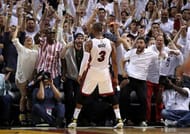
The Flash is one of the greatest players of this century. A prime Dwyane Wade was as good a two-way weapon as arguably anyone in NBA history (other than our top 10 players here). D-Wade is the greatest shot-blocking guard of all time and probably the best player in NBA history at splitting double teams.
He could get to the paint at will and is an extremely underrated finisher above and below the rim - his career percentage of shots attempted within 0-3 feet is basically the same as LeBron's at 35.1%. A lack of All-Defensive Team accolades should never detract from the fact that Wade is one of the best help defenders to ever play the guard position or the fact that his on-ball defense was as good as any guard not named Tony Allen or Kobe Bryant in the 21st century.
His performance in the 2006 NBA Finals defies superlatives and is the greatest Finals performance I've ever had the chance to witness. He was already a clutch playoff performer as he proved in his rookie season, and the arrival of Shaq took the Heat to a whole other level and opened up more room for him to operate as the alpha.
The Heat's post-championship seasons were a mess, however. Despite D-Wade's best efforts, they couldn't be any better than teams that exit the playoffs in the first round. The arrivals of LeBron and Bosh on South Beach changed all of that.
D-Wade started deferring to LeBron and gave up some of his playmaking responsibilities to #6. Even so, as the best player in the 2011 Finals, he would've won a second Finals MVP trophy but for the clutch performances put in by the seasoned vets on that Mavs team. However, 2 wins in the 2 subsequent seasons put Wade at 3 championships won.
The clock on his body had always been ticking since the moment he had his meniscus removed on both of his knees, and he began feeling the full effects of this in the 2013-14 season. Still playing at an All-Star level during the regular season, his drop in athleticism during the playoffs was, however, concerning.
After LeBron's departure from South Beach, the greatest player in Miami Heat history somehow found the fire inside him to guide them past the Charlotte Hornets in the first round of the 2016 playoffs - hitting 3-pointers as he'd never done before. The Raptors managed to outlast the older Heat in 7 games in the Conference Semifinals, and Wade bolted for his hometown Bulls the following season to link up with Jimmy Butler and Rajon Rondo.
That did not go too well for the Bulls, who have since let all 3 players go. Coming off the bench for both the Heat and the Cavaliers this 2017-18 season, Wade proved that he's still capable of playing at a high level in the league. If only he decides to sign one last contract with the Heat...
#23 David Robinson
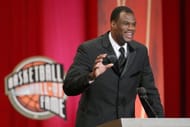
The Admiral, as the former Navyman is fondly called by basketball fans across the world, is one of the greatest players to ever grace the NBA. Drafted #1 overall by the Spurs in 1987, Robinson served for 2 more years with the US Navy before entering the league as a 24-year-old and dominating from the moment he donned a Spurs jersey.
His rookie averages speak for themselves: 24.3 points, 12.0 rebounds, 2.0 assists, 1.7 steals and a whopping 3.9 blocks per game. The Spurs improved by 35 wins, going from a 21-61 record in 88-89 to a 56-26 record the season after.
The reason Robinson was able to stuff the stat sheet so utterly is because he was a perimeter player in high school, joining the Naval Academy at a height of 6'8" before growing to his full adult height of 7'1". Pretty much like Anthony Davis today, this gave Robinson unique abilities as a big man because of his past as a 6'6" player in the final year of high school.
His ability to run the floor at his size made him a nightmare matchup for most opposition centers, while his stifling defense on other big men of his time made him one of the most complete players of any era.
Robinson was unable to taste championship champagne until his 10th professional season - after the end of the Bulls dynasty. The emergence of Tim Duncan as a dominant two-way player right off the bat allowed him to shoulder a reduced load.
The duo won 2 titles together before Robinson retired from the game for good in 2003. He was inducted into the Naismith Memorial Basketball Hall of Fame along with Michael Jordan, John Stockton and Jerry Sloan in 2009 - a first-ballot selection.
#22 Karl Malone
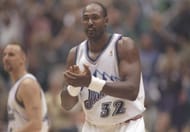
It is a travesty that players of Stockton and Malone's caliber never got to win a championship despite performing at the highest level for over 15 seasons of their careers (thank you, MJ, I guess). Malone is second on the all-time list for most points scored in the regular season. He was the epitome of durability in the first 18 seasons of his career, playing all but 8 games during those seasons and playing in all 82 games of the season 10 times.
As iconic as the 90s were for the Bulls' utter dominance of the NBA, it wouldn't have been called the Golden Era of basketball if teams like the Utah Jazz and players like John Stockton and Karl Malone weren't there to push them right to the brink.
The Mailman wasn't called so without a reason. Other than Michael Jordan, Malone was the most dominant scorer of his generation - he is the only player other than MJ to average over 25 points per game for 10 straight full seasons in the league during the 20th century.
We've already talked about how the Stockton-Malone pick-and-roll has generated the most points out of any play type in NBA history. If Stockton is the perfect ballhandler for the situation, Malone came into the NBA with the physique and athleticism quintessentially required of a dominant roll man. Built like a tank weighing 250 pounds and with some of the most iconic arms in NBA history, Malone was the ultimate post-up powerhouse of his generation.
While players like Hakeem and Kevin McHale used their nifty footwork as their main weapons down low, nobody other than Shaq was able to bang down low in Malone's fashion during those times. He had a well-rounded scoring skillset - having initially come into the league as a bad free throw shooter, the Mailman improved on his percentages and was averaging over 70% conversion by his 3rd professional season, and has a career average of 74.2% despite a couple of bad initial seasons.
The oldest winner of the MVP award in NBA history, Malone was a dependable player even in his final go-around with the Lakers in the 2003-04 season. He is up there among the greatest players to play the power forward position, and his longevity of excellence beats out even the likes of Tim Duncan and Kevin Garnett.
#21 Isiah Thomas
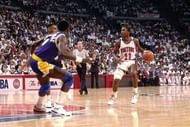
Having made his debut in the golden age for big men in the NBA, Isiah is still the only point guard other than Stephen Curry to be the best player on a team while also being its shortest. Drafted by the Pistons in the 1981 NBA Draft with the 2nd overall pick, Thomas rose to prominence in his very first season, making the All-Star team as a rookie and sparking the Pistons to an 18-win boost from their 21-61 record in the previous season (they finished in 3rd place in the Central Division and qualified for the playoffs).
Isiah made consecutive All-Star Game appearances for 12 seasons after this. While his best scoring season was '82-83 when he averaged 22.9 points and 7.8 assists per game, he took the league's assists title with a mind-boggling 13.9 apg average in the '84-85 season on top of his 21.2 ppg scoring average.
The Pistons drafted quite well following Isiah's rise, and by the '86-87 season, they were challenging for a berth in the NBA Finals. They took defending champions Boston to 7 games in the Conference Finals and were in the thick of Finals action the following year.
By this time, the core of the Bad Boy Pistons era had already arrived at the franchise and the unit as a whole was revered as one of the greatest defensive lineups in history - spearheaded by Bill Laimbeer at center and Dennis Rodman as a forward. Game 6 of the 1988 NBA Finals saw Isiah unleash a historic scoring outburst, shaking off a nagging ankle sprain suffered earlier in the same game to score a Finals record 24 points in a quarter.
The Pistons lost the series 4-3 but proceeded to stamp their authority as the premier team in the NBA the following season with a 4-0 sweep of the injury-hobbled Lakers. They defended their title successfully with a 4-1 victory over Clyde Drexler's Portland Trail Blazers the following year after being stretched to the limit by the Bulls in the Conference Finals
The rise of Michael Jordan and Scottie Pippen as the Association's premier two-way swingmen eventually helped them over the top, as the Pistons had to make way for a new era in basketball. Nevertheless, Isiah continued his dominant play up until his final season (1993-94), and retired still near the top of his game.
Mr. Wonderful was one of the fastest players ever to grace an NBA court, and he used his sick handles to pave the way for one of the most effective driving games for any player in the history of the game. At his peak, he was a great two-way player (although the accolades of his era were dominated by the likes of Sidney Moncrieff, Michael Jordan and Alvin Robertson), as evidenced by his career steals average of 1.9 per game.
